2016 | OriginalPaper | Buchkapitel
Learning to Cope with Turbulent Situations: A Study of Owner—Managers in Argentine SMEs
verfasst von : Peter Friedrich, Juan Carlos Hiba
Erschienen in: Competitive Strategies for Small and Medium Enterprises
Aktivieren Sie unsere intelligente Suche, um passende Fachinhalte oder Patente zu finden.
Wählen Sie Textabschnitte aus um mit Künstlicher Intelligenz passenden Patente zu finden. powered by
Markieren Sie Textabschnitte, um KI-gestützt weitere passende Inhalte zu finden. powered by
